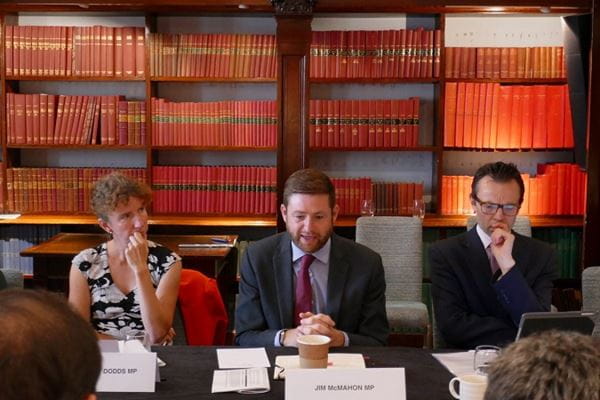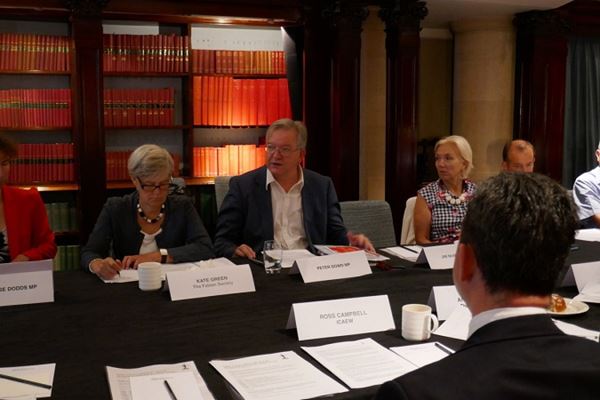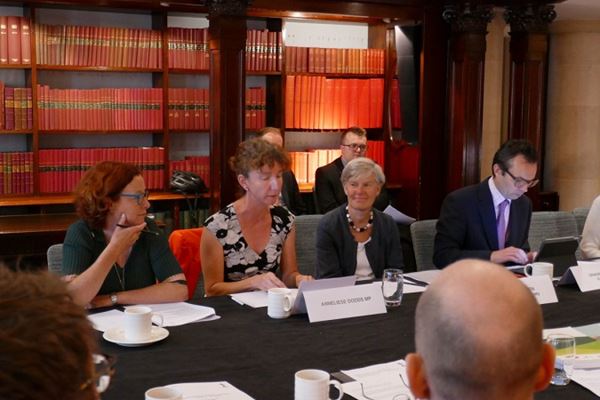Throughout June and July 2018, ICAEW and the Fabian Society will be assessing how Labour can realise aspirations of its 2017 manifesto, in the context of a sound financial stewardship of the UK's economy.
Over the coming weeks, Ross Campbell, ICAEW's Director, Public Sector and the Fabian Society's General Secretary, Andrew Harrop, will be sharing their thoughts on:
- How can the Labour party achieve higher public spending and fiscal sustainability?
- How can fiscal and accounting rules be reformed to support investment and the public ownership of assets?
- What approach should be taken to the devolution of public finances, local taxes and geographic fairness?
Roundtable discussion with shadow ministers
On 11 July, ICAEW hosted a roundtable event, with guest speakers Peter Dowd MP, shadow chief secretary, Anneleise Dodds MP, shadow treasury minister, and Jim McMahon MP, shadow devolution minister. At the half day event, the speakers offered their analysis of the key questions raised in this project, and listened to the insights and opinions of policy makers and finance industry representatives who also attended the event. The discussion was summarised by Ross Campbell and Andrew Harrop at a webinar on 19th July, and will contribute to a final report to be published later in the summer.






How can the Labour party achieve higher public spending and fiscal sustainability?
8 June - Rebalancing the books
Five years ago, the Fabian Society’s 2013 commission on future spending choices published proposals for public spending under a Miliband-led government. In the intervening years both the economic and the political terrain has changed beyond recognition.
15 June - Realising the left's ambitions
ICAEW's Director of Public Sector, Ross Campbell, argues that an equilibrium must be struck between creating the conditions to encourage economic growth, running government efficiently and setting sustainable tax rates, in order to ensure fiscal sustainability.
How can fiscal and accounting rules be reformed to support investment and the public ownership of assets?
22 June - Fiscal policy for an activist state
The Labour party’s 2017 manifesto promised a decisive shift in the economic role of the state. Economic activism and fiscal prudence must go hand in hand under a Corbyn government, writes Andrew Harrop.
29 June - Reforming fiscal rules
This issue is about how the Chancellor sets targets for overall public expenditure and investment, as well as how Treasury controls the way departments spend their allocation of capital and resource budgets, argues Ross Campbell.
What approach should be taken to the devolution of public finances, local taxes and geographic fairness?
6 July - devolution of public finance
There is an imbalance in the UK economy, as commercial activity is heavily skewed towards London and the Southeast. Ross Campbell, ICAEW's Director of Public Sector, argues that increased devolution is desirable, but may not lead to stronger businesses in all regions. Considerable central government intervention will be required to ‘level’ the playing field.
11 July - Walking a fine line
Fiscal geography and local taxation are controversial issues in UK politics. Successful reform goes unnoticed, while failures and botches are punished hard. It would be no surprise if a future Labour government were to choose the path of indecision or incremental revision over radical reform, argues Andrew Harrop.